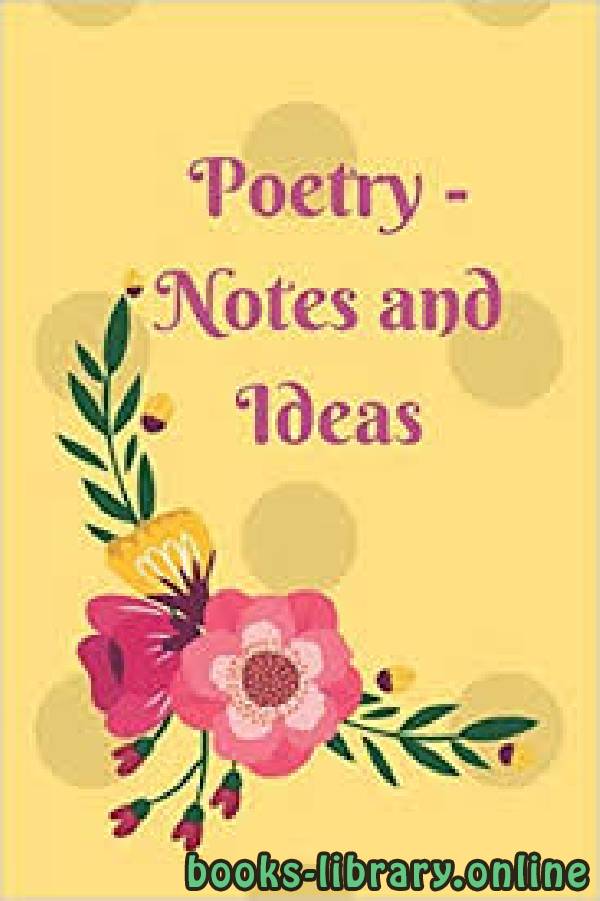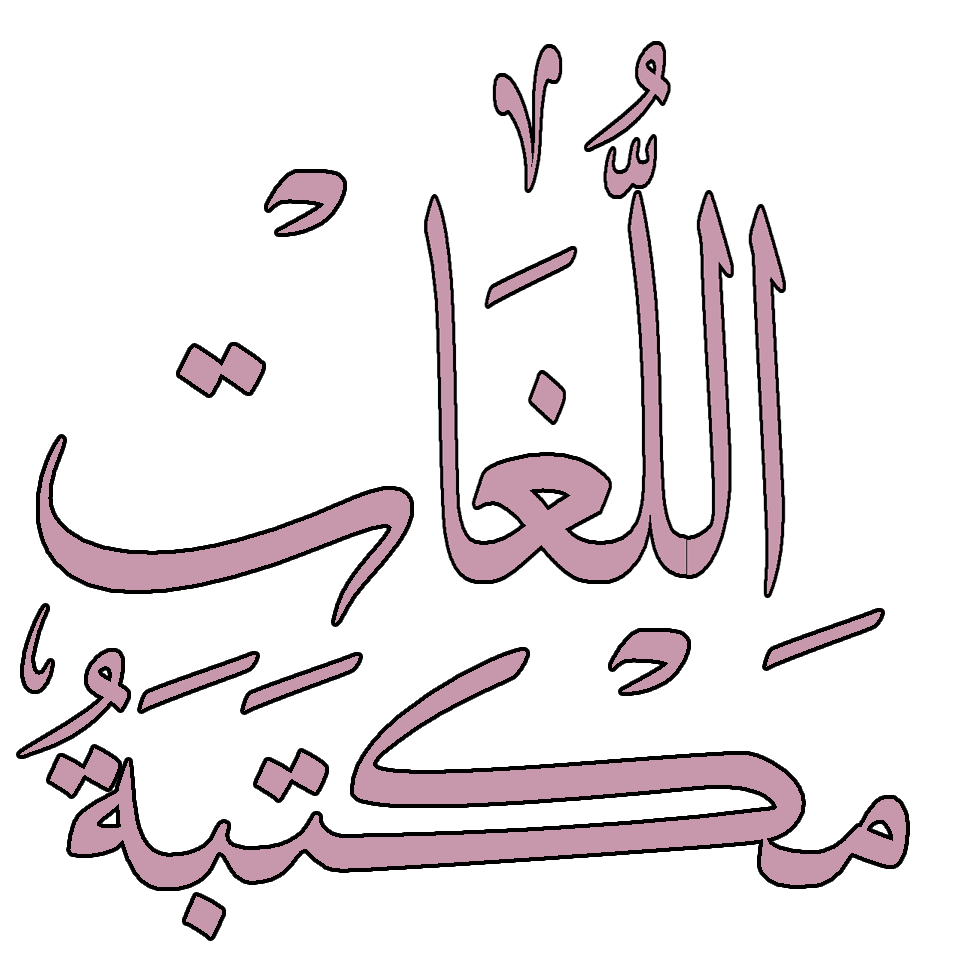📘 قراءة كتاب POETRY NOTES أونلاين


هذا القسم يحتوي علي العديدمن المصادر التي تختص بالشعر وعلومه.
يصعب تعريف الشعر بطريقة تشمل أنواعه في مختلف اللغات، لكن هناك عدد من التعريفات التي قد تعطي معنى متكاملاً عن ماهية الشعر. عُرّف الشعر بأنه كلام موزون مقفىّ (للشعر العربي)، دالٌ على معنى، ويكون أكثر من بيت، ويشمل هذا التعريف النظم. وقال بعضهم: هو الكلام الذي قصد إلى وزنه وتقفيته قصداً أولياً، فأما ما جاء عفو الخاطر من كلام لم يقصد به الشعر فلا يقال له شعر، وإن كان موزونا. وقد عرفه ابن خلدون بأنه: «هو الكلام البليغ المبني على الاستعارة والأوصاف، المفصل بأجزاء متفقة في الوزن والروي، مستقل كل جزء منها في غرضه ومقصده عما قبله وبعده، الجاري على أساليب العرب المخصوصة به». الشعر: هو شكل من أشكال الفن الأدبي في اللغة التي تستخدم الجمالية والصفات بالإضافة إلى أو بدلاً من معنى الموضوع الواضح. قد تكون كتابة الشعر بشكل مستقل، وقصائد متميزة، أو قد تحدث جنبا إلى جنب مع الفنون الأخرى، كما في الدراما الشعرية، التراتيل، النصوص الشعرية، أو شعر النثر. أما من الناحية المعنوية فإن الشعر هو العِلم.
Poetry (derived from the Greek poiesis, "making") is a form of literature that uses aesthetic and rhythmic qualities of language—such as phonaesthetics, sound symbolism, and metre—to evoke meanings in addition to, or in place of, the prosaic ostensible meaning.
Poetry has a long history dating back to prehistoric times with hunting poetry in Africa, and to panegyric and elegiac court poetry of the empires of the Nile, Niger, and Volta River valleys.[4] Some of the earliest written poetry in Africa is found among the Pyramid Texts written during the 25th century BCE. The earliest Western Asian epic poetry, the Epic of Gilgamesh, was written in Sumerian.
Early poems in the Eurasian continent evolved from folk songs such as the Chinese Shijing; or from a need to retell oral epics, as with the Sanskrit Vedas, the Zoroastrian Gathas, and the Homeric epics, the Iliad and the Odyssey. Ancient Greek attempts to define poetry, such as Aristotle's Poetics, focused on the uses of speech in rhetoric, drama, song, and comedy. Later attempts concentrated on features such as repetition, verse form, and rhyme, and emphasized the aesthetics which distinguish poetry from more objectively-informative prosaic writing.
Poetry uses forms and conventions to suggest differential interpretation to words, or to evoke emotive responses. Devices such as assonance, alliteration, onomatopoeia, and rhythm are sometimes used to achieve musical or incantatory effects. The use of ambiguity, symbolism, irony, and other stylistic elements of poetic diction often leaves a poem open to multiple interpretations. Similarly, figures of speech such as metaphor, simile, and metonymy[5] create a resonance between otherwise disparate images—a layering of meanings, forming connections previously not perceived. Kindred forms of resonance may exist, between individual verses, in their patterns of rhyme or rhythm.
Some poetry types are specific to particular cultures and genres and respond to characteristics of the language in which the poet writes. Readers accustomed to identifying poetry with Dante, Goethe, Mickiewicz, or Rumi may think of it as written in lines based on rhyme and regular meter. There are, however, traditions, such as Biblical poetry, that use other means to create rhythm and euphony. Much modern poetry reflects a critique of poetic tradition,[6] testing the principle of euphony itself or altogether forgoing rhyme or set rhythm.[7][8] In today's increasingly globalized world, poets often adapt forms, styles, and techniques from diverse cultures and languages.
Contents
1 History
1.1 Western traditions
1.2 20th-century and 21st-century disputes
2 Elements
2.1 Prosody
2.1.1 Rhythm
2.1.2 Meter
2.1.3 Metrical patterns
2.2 Rhyme, alliteration, assonance
2.2.1 Rhyming schemes
2.3 Form in poetry
2.3.1 Lines and stanzas
2.3.2 Visual presentation
2.4 Diction
3 Forms
3.1 Sonnet
3.2 Shi
3.3 Villanelle
3.4 Limerick
3.5 Tanka
3.6 Haiku
3.7 Khlong
3.7.1 Khlong si suphap
3.8 Ode
3.9 Ghazal
4 Genres
4.1 Narrative poetry
4.2 Lyric poetry
4.3 Epic poetry
4.4 Satirical poetry
4.5 Elegy
4.6 Verse fable
4.7 Dramatic poetry
4.8 Speculative poetry
4.9 Prose poetry
4.10 Light poetry
4.11 Slam poetry
POETRY NOTES
a type of literature that
expresses ideas and
feelings, or tells a story
in a specific form
(usually using lines and stanzas)
POET
the author of the poem, the person who
actually wrote it
VS
SPEAKER
the “narrator” of the poem, the voice telling
us the thoughts/feelings/story
- 1. POETRY
- 2. Poetry Vocabulary 1. line - a group of words together on one line of the poem 2. stanza - a group of lines arranged together; “poem paragraphs” 3. free verse (n): poetry without regular patterns of rhyme or rhythm 4. Rhyme - Words sound alike because they share the same ending vowel and consonant sounds. 5. rhyme scheme (n): the pattern of end rhyme in a poem 6. onomatopoeia (n): the use of words whose sounds suggests their meaning Ex: Buzz, Bam, Zip, Bang
- 3. 7. alliteration (n): repetition of consonant sounds at the beginning of words Ex: Peter Piper picked a pair of pickled peppers 8. lyric poem - A short poem that is usually written in first person point of view and expresses an emotion; often musical 9. haiku (n): a traditional form of Japanese poetry that has three lines: line one: five syllables each line two: seven syllables each line three: five syllables each 10. narrative poems - A poem that tells a story. 11. Concrete poems - a poem in which the words are arranged to create a picture that relates to the content of the poem.
- 4. 12. Simile – a comparison of two things using the words “like” or “as” Ex: The boy eats like a pig 13. Metaphor – a comparison of two things Ex: The boy is a pig. 14. hyperbole - Exaggeration often used for emphasis. Ex: The roller coast was going so fast that it blew my face off! 15. Idiom - An expression where the literal meaning of the words is not the meaning of the expression. Ex: It’s raining cats and dogs 16. Personification - An animal given human-like qualities or an object given life-like qualities Ex: The tree danced in the wind.
- 5. POETRY A type of literature that expresses ideas, feelings, or tells a story in a specific form (usually using lines and stanzas)
- 6. POINT OF VIEW IN POETRY POET 4 The poet is the author of the poem. SPEAKER 4 The speaker of the poem is the “narrator” of the poem.
- 7. POETRY FORM 4 FORM - the appearance of the words on the page 4 1. LINE - a group of words together on one line of the poem 4 2. STANZA - a group of lines arranged together “poem paragraphs” A word is dead When it is said, Some say. I say it just Begins to live That day.
- 8. SOUND EFFECTS
- 9. RHYTHM 4 The beat created by the sounds of the words in a poem 4 Rhythm can be created by meter, rhyme, alliteration and refrain.
- 10. 3. FREE VERSE POETRY 4 Unlike metered poetry, free verse poetry does NOT have any repeating patterns of stressed and unstressed syllables. 4 Does NOT have rhyme. 4 Free verse poetry is very conversational - sounds like someone talking with you. 4 A more modern type of poetry.
- 11. 4. RHYME 4 Words sound alike because they share the same ending vowel and consonant sounds. 4 (A word always rhymes with itself.) LAMP STAMP á Share the short “a” vowel sound á Share the combined “mp” consonant sound
- 12. END RHYME 4 A word at the end of one line rhymes with a word at the end of another line Hector the Collector Collected bits of string. Collected dolls with broken heads And rusty bells that would not ring
english poetry pdf
poetry books pdf
types of poetry
definitions of poetry
types of poetry
poetry english
short poetry
poetry about life
poetry elements
poetry wikipedia
poetry معنى
سنة النشر : 2016م / 1437هـ .
حجم الكتاب عند التحميل : 1.6MB .
نوع الكتاب : pdf.
عداد القراءة:
اذا اعجبك الكتاب فضلاً اضغط على أعجبني و يمكنك تحميله من هنا:

شكرًا لمساهمتكم
شكراً لمساهمتكم معنا في الإرتقاء بمستوى المكتبة ، يمكنكم االتبليغ عن اخطاء او سوء اختيار للكتب وتصنيفها ومحتواها ، أو كتاب يُمنع نشره ، او محمي بحقوق طبع ونشر ، فضلاً قم بالتبليغ عن الكتاب المُخالف:
 قبل تحميل الكتاب ..
قبل تحميل الكتاب ..
يجب ان يتوفر لديكم برنامج تشغيل وقراءة ملفات pdf
يمكن تحميلة من هنا 'http://get.adobe.com/reader/'


 منصّة المكتبة
منصّة المكتبة 